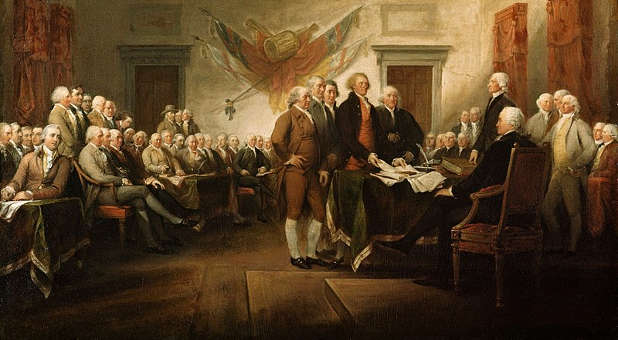Historians have noted that slavery, although practiced for thousands of years by many peoples and civilizations, suddenly became anathema in 18th-century America. The late historians Elizabeth Fox-Genovese and Eugene Genovese observed, “Perception of slavery as morally unacceptable—as sinful—did not become widespread until the second half of the 18th century.”
Among those who turned against slavery in the 18th century were America’s founders. The brilliant scholar, Dr. Thomas Sowell, who happens to be black, has confirmed this, saying:
“Slavery was just not an issue, not even among intellectuals, much less among political leaders, until the 18th century—and then it was an issue only in Western civilization. Among those who turned against slavery in the 18th century were George Washington, Thomas Jefferson, Patrick Henry and other American leaders. You could research all of 18th-century Africa or Asia or the Middle East without finding any comparable rejection of slavery there” (Hyatt, 1726: The Year that Defined America, 90).
Dr. Walter Williams, professor of economics at George Mason University, has said that the unique characteristic of slavery in America was not only the brevity of its existence, but also the “moral outrage” against it. This moral outrage had far-reaching effects and impacted America’s Founding Fathers. But what was the source of this sudden moral outrage against slavery?
The Source of the Moral Outrage Against Slavery
The source of this sudden moral outrage against slavery is to be found in what became known as the Great Awakening. In this Christian revival that ebbed and flowed from 1726 to 1770, it seemed that entire towns repented and turned to God. In his Autobiography, Benjamin Franklin described the amazing transformation of his hometown of Philadelphia in 1739. He wrote:
“It was wonderful to see the change soon made in the manners of our inhabitants. From being thoughtless or indifferent about religion, it seemed as if all the world were growing religious so that one could not walk through the town in an evening without hearing psalms sung in different families of every street” (Hyatt, 1726: The Year that Defined America, 79).
Out of this revival there emerged a deep concern for the those who did not know Christ. As a result, many evangelists began taking the message of salvation to the marginalized of society, including blacks, both slave and free. Their ministries breached racial and cultural barriers, and they saw many come to Christ. Black preachers and churches emerged out of this Awakening, as well as the moral outrage against slavery, which the historians above have noted.
From Evangelism to Social Transformation
At the beginning of the Great Awakening in 1726, outreach to the black populace was evangelistic in nature and not characterized by opposition to slavery. Those early preachers, such as George Whitefield, Gilbert Tennant and Jonathan Edwards, saw their primary purpose to be in getting people ready for the next world, not necessarily improving their lot in this one. In their thinking, a slave on his way to heaven was far better off than a king on his way to hell.
Nonetheless, their insistence on sharing the Gospel with all people and their willingness to share Christian fellowship with blacks, both slave and free, breached racial and cultural barriers in Colonial America. Also, the inclusive Gospel message they preached, and their compassionate treatment of blacks, created a climate conducive to the anti-slavery sentiments that would burst forth through those who would come after them.
Second Generation Awakening Preachers Attack Slavery
Indeed, the revivalists who came after Edwards and Whitefield carried the message of their predecessors to its logical conclusion. If we are all creatures of the same Creator, and if Christ died that all might be saved, then how can slavery ever be justified?
They, therefore, began a vicious attack on the institution of slavery. This is what historian Benjamin Hart, was referring to when he wrote, “Among the most ardent opponents of slavery were ministers, particularly the Puritan and revivalist preachers (Hyatt, 1726: The Year that Defined America, 92).
These “ardent opponents of slavery” included the followers of Jonathan Edwards, who expanded on his idea of the essential dignity of all created beings and applied it to the black community of Colonial America. They included Levi Hart in Connecticut; Edwards’ son, Jonathan Jr., also in Connecticut; Jacob Green in New Jersey and Samuel Hopkins in Rhode Island.
The Hypocrisy of Demanding Liberty and Tolerating Slavery
Samuel Hopkins (1721–1803), who had been personally tutored by Edwards, pastored for a time in Newport, Rhode Island, an important hub in the transatlantic slave trade. Like Paul, whose spirit was “provoked” observing the idols in Athens, Hopkins was outraged by what he observed in Newport. He, therefore, began to passionately speak out against this “violation of God’s will” and declared, “This whole country have their hands full of blood this day” (Hyatt, 1726: The Year that Defined America, 92).
After the First Continental Congress convened in Philadelphia in 1774, Hopkins sent a pamphlet to every member of the Congress, asking how they could complain about “enslavement” to Great Britain and overlook the “enslavement” of so many blacks in the colonies.
Indeed, as “liberty” became a watchword throughout the colonies, these second-generation Awakening preachers began applying it to the enslaved blacks in America. Like Hopkins, they pointed out the hypocrisy of demanding freedom from Great Britain while enslaving black Africans. One of the most vocal was the Baptist preacher John Allen, who thundered, “Blush ye pretended votaries of freedom! ye trifling Patriots! who are making a vain parade of being advocates for the liberties of mankind, who are thus making a mockery of your profession by trampling on the sacred natural rights and privileges of Africans” (Hyatt, 1726: The Year that Defined America, 156).
The opposition to slavery thus mounted as other ministers of the Awakening began to speak out. For example, in a sermon preached and published in 1770, Samuel Cooke declared that by tolerating the evil of slavery, “We, the patrons of liberty, have dishonored the Christian name, and degraded human nature nearly to a level with the beasts that perish” (Hyatt, 1726: The Year that Defined America, 93). {eoa}
This article is derived from Dr. Eddie Hyatt’s latest book, 1726: The Year that Defined America, available from Amazon and his website at eddiehyatt.com. This book documents how the Great Awakening (1726-1770) had a direct bearing on the founding of the United States of America and unleashed the moral and spiritual forces that led to the elimination of slavery on the American continent.
For more of this article, visit biblicalawakening.blogspot.com.
See an error in this article?
To contact us or to submit an article






















